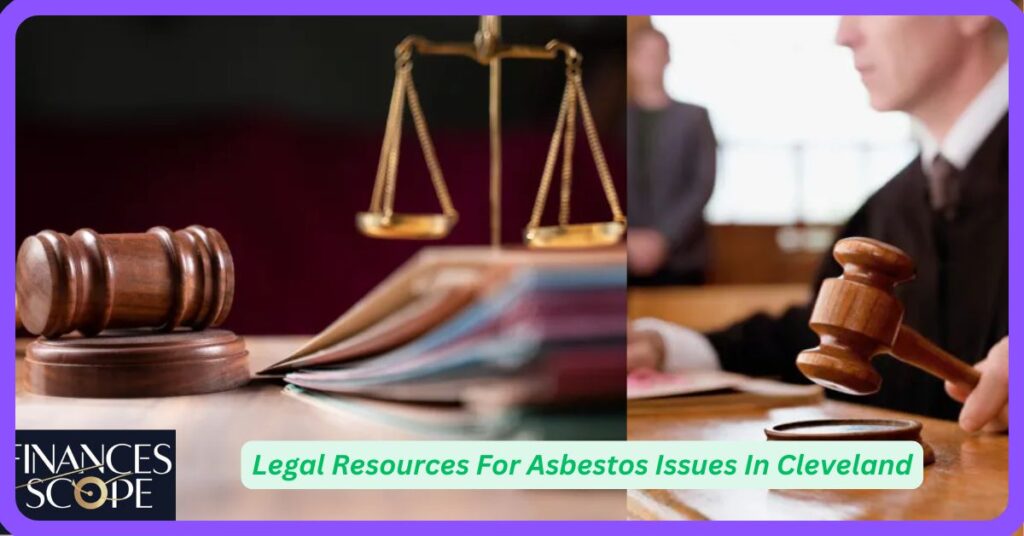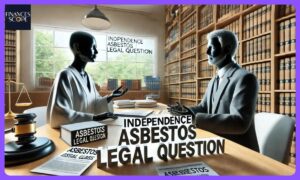Asbestos is a group of naturally occurring minerals. These minerals have been widely used in various industries. They are known for their heat-resistant properties.
Asbestos fibers are strong and durable. This made them popular in construction and manufacturing. However, asbestos poses serious health risks.
When disturbed, it releases tiny fibers into the air. These fibers can be inhaled. They can cause severe lung diseases. Some of these diseases are life-threatening.
Asbestos And Its Legal Implications
In the late 20th century, the dangers of asbestos became clear. This led to legal action and regulation. The U.S. government began implementing laws. These laws aimed to protect public health. They restricted the use of asbestos. They also set guidelines for its removal and disposal.

In Cleveland, asbestos is a significant concern. Many older buildings contain this hazardous material. The city faces ongoing challenges. These include managing asbestos safely. Legal questions often arise. They involve exposure, removal, and liability.
Asbestos litigation is complex. It can involve multiple parties. These may include property owners, employers, and manufacturers. Understanding the legal landscape is crucial. It affects many people in Cleveland. Those dealing with asbestos issues need this knowledge.
Specifics Of Asbestos Legislation In Cleveland
Cleveland follows both state and federal asbestos laws. Ohio has its own set of regulations. These complement federal guidelines. The city may also have additional local ordinances.
The Ohio Environmental Protection Agency (EPA) oversees asbestos activities. They enforce regulations on asbestos management. This includes removal, transportation, and disposal. The agency ensures compliance with state and federal laws.
Cleveland’s Department of Building and Housing plays a key role. They ensure compliance in construction and renovation projects. Property owners must obtain proper permits. These are required for any asbestos-related work.
Key aspects of Cleveland’s asbestos legislation include licensing requirements. Asbestos professionals must be certified. There are strict notification procedures. These apply to asbestos removal projects.
Safety standards are enforced. They cover handling and disposing of asbestos. Inspection protocols are in place. They apply to buildings suspected of containing asbestos.
Penalties for violating asbestos laws in Cleveland are severe. They may include heavy fines. Criminal charges are possible in some cases. This strict approach aims to ensure public safety. It also protects public health.
The city requires documentation for asbestos work. This includes detailed work plans. Air monitoring reports are often necessary. These ensure that asbestos fibers are not released during removal.
Cleveland also focuses on public awareness. The city provides information about asbestos risks. They offer guidance on proper management. This helps residents and businesses comply with regulations.
Common Asbestos-Related Legal Issues In Cleveland
Several legal issues commonly arise in Cleveland regarding asbestos. Personal injury claims are frequent. Individuals exposed to asbestos may develop serious health conditions. They often seek compensation. This covers medical expenses and suffering.

Wrongful death lawsuits are another common issue. Families of those who died from asbestos-related diseases may file claims. These cases can be emotionally and legally complex.
Property damage cases occur in Cleveland. Building owners may face costs for asbestos removal. They might seek compensation from previous owners or manufacturers. These cases often involve disputes over liability.
Workers’ compensation claims are common. Employees exposed to asbestos on the job may file for benefits. These claims can be challenging. They often require proving the link between work exposure and illness.
Environmental violations are a serious concern. Companies improperly handling asbestos may face legal action. Regulatory agencies can impose hefty fines. They may also require extensive remediation efforts.
The statute of limitations is crucial in asbestos cases. In Ohio, the time limit for filing claims varies. It depends on the type of case. The discovery date of the injury is also important. This can complicate legal proceedings.
Cleveland has seen several landmark asbestos cases. These have shaped local legal precedents. They often involve industrial sites or large-scale construction projects. These cases have influenced how courts handle asbestos litigation.
Asbestos litigation can be complex and lengthy. It often requires extensive evidence gathering. Expert testimony is frequently needed. This helps establish causation and liability. The process can be challenging for all parties involved.
Health Impact Of Asbestos In Cleveland
Asbestos exposure poses serious health risks to Cleveland residents. The most common asbestos-related diseases are well-documented. Mesothelioma is a rare, aggressive cancer. It affects the lining of the lungs or abdomen.

Lung cancer can develop years after asbestos exposure. Asbestosis is a chronic lung disease. It causes scarring of lung tissue. Pleural plaques are also common. They involve thickening of the lung lining.
Cleveland’s industrial history increases asbestos risks. Many workers were exposed in factories. Shipyards and construction sites were also high-risk areas. Residents living near these areas may also be at risk. This creates a widespread public health concern.
Health statistics show higher rates of asbestos-related diseases in certain Cleveland neighborhoods. These often correlate with areas of historical industrial activity. This pattern highlights the long-term impact of past asbestos use.
The latency period for asbestos-related diseases is long. Symptoms may not appear for 20-50 years after exposure. This complicates both medical treatment and legal proceedings. It makes early detection challenging.
Cleveland’s health departments actively monitor asbestos-related health issues. They work to identify high-risk areas and populations. Public health initiatives focus on early detection and treatment. These efforts aim to improve outcomes for those affected.
Occupational exposure remains a concern in Cleveland. Some industries still work with asbestos-containing materials. Strict safety protocols are essential. They help protect workers from ongoing exposure risks.
The emotional impact of asbestos-related diseases is significant. Patients and families face stress and uncertainty. Support groups in Cleveland offer assistance. They provide resources and community for those affected.
Legal Resources For Asbestos Issues In Cleveland
Cleveland offers various legal resources for asbestos-related issues. Specialized law firms are available. Many local attorneys focus on asbestos litigation. They have extensive experience in this complex field.

Legal aid organizations provide assistance. They help low-income individuals navigate asbestos issues. These services are crucial for ensuring access to justice.
The Cleveland Bar Association maintains a list of experienced attorneys. They can provide referrals based on specific needs. This helps individuals find qualified legal representation.
Several non-profit organizations in Cleveland offer support to asbestos victims. They provide information and resources. Some offer guidance on legal matters. These organizations play a vital role in community support.
The Ohio Attorney General’s Office has resources on consumer protection. This includes information on asbestos-related fraud and scams. They help protect vulnerable individuals from exploitation.
For workers, the Ohio Bureau of Workers’ Compensation provides information. They focus on occupational asbestos exposure claims. This resource is valuable for those exposed on the job.
Online resources are also available to Cleveland residents. These include databases of asbestos products and companies. They can be valuable for building exposure histories. This information is often crucial in legal cases.
Local libraries in Cleveland offer access to legal materials. They provide books and databases on asbestos law. These resources are free to the public. They help individuals research their rights and options.
Government agencies provide information on regulations and rights. The EPA and OSHA websites offer detailed guidance. They cover asbestos safety and legal requirements. These resources are valuable for both individuals and businesses.
Read This Blog: Understanding The Dr. David Schuh Malpractice Lawsuit: Key Details And Implications
Asbestos Removal And Remediation Procedures In Cleveland
Asbestos removal in Cleveland must follow strict procedures. The process begins with inspection. A certified inspector must assess the presence of asbestos. This step is crucial for safety and legal compliance.
Notification is the next step. The Ohio EPA must be informed before major removal projects. This allows for proper oversight and monitoring. It ensures that all safety protocols are followed.
Containment is essential in asbestos removal. The work area must be sealed off. This prevents fiber release into the environment. Proper containment protects both workers and nearby residents.
Only licensed professionals can remove asbestos-containing materials. This requirement ensures that removal is done safely. It minimizes the risk of exposure during the process.
Disposal of asbestos waste is strictly regulated. It must be properly bagged and labeled. Disposal occurs only at approved sites. This prevents environmental contamination.
Cleveland requires all asbestos professionals to be licensed by the state. This includes inspectors, contractors, and workers. Licensing ensures that professionals are properly trained. It helps maintain high safety standards.
The city’s Building and Housing Department oversees permits. These are required for renovation and demolition projects. They ensure proper asbestos management in these activities. This oversight is crucial for public safety.
Air monitoring is often required during and after asbestos removal. This ensures that fibers are not released. It provides confirmation that the area is safe after work is completed.
Homeowners should never attempt DIY asbestos removal. It’s illegal and dangerous. Always hire certified professionals for any asbestos-related work. This protects both health and legal compliance.
After removal, a final inspection is necessary. This ensures all asbestos has been properly removed. It confirms that the area is safe for reoccupation. This step provides peace of mind for property owners and occupants.
Preventive Measures And Public Health Initiatives
Cleveland has implemented various measures to prevent asbestos exposure. Public education programs are a key component. They raise awareness about asbestos risks. These programs teach proper management techniques.
School inspections are conducted regularly. They check for asbestos in educational facilities. This protects students and staff from potential exposure. It’s a critical part of maintaining safe learning environments.

Workplace monitoring ensures compliance with safety standards. Regular inspections help identify potential hazards. They enforce proper handling of asbestos-containing materials.
Community outreach targets high-risk neighborhoods. These areas receive focused information and resources. This approach helps address disparities in asbestos exposure risks.
The Cleveland Department of Public Health leads many initiatives. They provide educational materials to the public. Community workshops are conducted regularly. These efforts help spread awareness and prevention strategies.
Cleveland participates in federal asbestos programs. This includes the National Emission Standards for Hazardous Air Pollutants (NESHAP). It sets standards for asbestos emissions during demolition and renovation.
The city offers grants and loans in some cases. These programs help property owners comply with safety regulations. They support asbestos abatement efforts. This financial assistance is crucial for many Cleveland residents.
Training programs are available for asbestos professionals. These ensure a skilled workforce for safe handling. They cover the latest techniques and regulations. This ongoing education is vital for maintaining safety standards.
Public health officials work to identify asbestos hotspots. This information guides prevention efforts. It helps target resources where they’re most needed. This strategic approach improves the efficiency of public health initiatives.
Cleveland’s preventive measures are ongoing and evolving. They adapt to new research and best practices. This proactive approach aims to reduce asbestos risks citywide.
The Role Of Legal Professionals In Asbestos-Related Cases
Legal professionals play a crucial role in asbestos cases in Cleveland. They evaluate potential claims. This involves assessing the strength of each case. Attorneys gather evidence to support claims. This includes medical records and employment histories.

Lawyers work on negotiating settlements. They interact with defendants and their representatives. If settlements aren’t reached, they represent clients in court. This litigation process can be complex and lengthy.
Attorneys specializing in asbestos cases have deep knowledge. They understand relevant laws and regulations. They’re familiar with the complex medical aspects of asbestos diseases. This expertise is crucial for effective representation.
In Cleveland, lawyers often work with medical experts. These collaborations help establish causation. Industrial hygienists may be consulted. They help document exposure histories. This multidisciplinary approach strengthens cases.
Legal professionals assist with filing claims against asbestos trust funds. These funds were established by bankrupt companies. They provide compensation to asbestos victims. Navigating these claims requires specialized knowledge.
Choosing the right attorney is crucial in asbestos cases. Experience is a key factor. A track record of successful cases is important. Familiarity with Cleveland’s specific asbestos landscape is valuable.
Attorneys also play an educational role. They inform clients about their rights. They explain the legal process and potential outcomes. This guidance is essential for those navigating complex asbestos litigation.
Legal professionals in Cleveland must stay updated on changing laws. Asbestos regulations evolve over time. Staying informed ensures the best representation for clients. It also helps in developing effective legal strategies.
The role of legal professionals extends beyond individual cases. They often advocate for stronger asbestos regulations. This work helps protect future generations from asbestos risks.
Also Read This Blog: Understanding The Cask Technologies LLC Lawsuit: Key Impacts And Industry Lessons
Recent Developments And Future Outlook
Recent developments in Cleveland’s asbestos landscape are significant. Stricter enforcement of existing regulations is evident. There’s an increased focus on asbestos in older public buildings. This reflects growing awareness of long-term exposure risks.
New technologies for asbestos detection are emerging. These improve the accuracy of building inspections. They help identify asbestos-containing materials more efficiently. This technological progress enhances safety efforts.
The COVID-19 pandemic has impacted asbestos litigation. Court delays have become more common. Remote proceedings are now frequent. These changes have altered how asbestos cases are handled.
Looking ahead, several trends are likely to shape asbestos issues in Cleveland. Aging infrastructure may lead to more asbestos discoveries. This could occur during renovation projects. It highlights the ongoing nature of asbestos challenges.
Advances in medical treatments for asbestos-related diseases are promising. They offer hope for improved patient outcomes. This medical progress may influence future legal cases.
Potential new legislation may emerge. This could occur at state or federal levels. Such changes could affect how asbestos cases are handled in Cleveland.
Environmental justice concerns are gaining attention. This may drive targeted efforts in certain Cleveland neighborhoods. It could lead to increased resources for underserved areas.
The legal landscape for asbestos cases continues to evolve. New precedents and rulings may impact future litigation strategies. This dynamic environment requires ongoing adaptation from legal professionals.
Cleveland may see more proactive measures for asbestos identification. Citywide surveys of at-risk buildings could be implemented. This proactive approach aims to prevent future exposures.
The future outlook involves balancing development with public health. As Cleveland grows and changes, managing asbestos risks remains crucial. Ongoing vigilance and adaptation will be necessary to address these challenges effectively.
Frequently Asked Questions
What is asbestos and why is it dangerous?
Asbestos is a group of heat-resistant minerals used in construction. It’s dangerous because inhaling its fibers can cause serious lung diseases, including cancer.
How can I tell if my home in Cleveland contains asbestos?
Professional testing is needed to identify asbestos. Homes built before 1980 are more likely to contain it. Visual inspection alone is not sufficient.
What should I do if I think I’ve been exposed to asbestos in Cleveland?
Seek medical attention for a health check. Contact an experienced asbestos attorney to discuss your legal options and potential next steps.
Who is responsible for asbestos removal in Cleveland?
Property owners are typically responsible for asbestos removal. However, landlords, employers, or others may be liable in certain situations.
How long do I have to file an asbestos-related lawsuit in Cleveland?
The time limit varies depending on the case type. Consult an attorney promptly to understand your specific deadline and preserve your legal rights.
Conclusion
Asbestos remains a significant concern in Cleveland. The city’s industrial history and aging infrastructure present ongoing challenges. Understanding the legal landscape is crucial for those affected by asbestos-related issues.
Key points to remember include the serious health consequences of asbestos exposure. Cleveland has strict regulations for asbestos management and removal. Legal resources are available for those dealing with asbestos issues. Prevention and public health initiatives play a vital role in protecting residents.

Marcus Delgado is a certified financial planner with expertise in retirement strategies and tax optimization.
With a background in economics and a passion for helping individuals achieve financial freedom, Marcus provides practical advice on long-term wealth building and smart money management.












